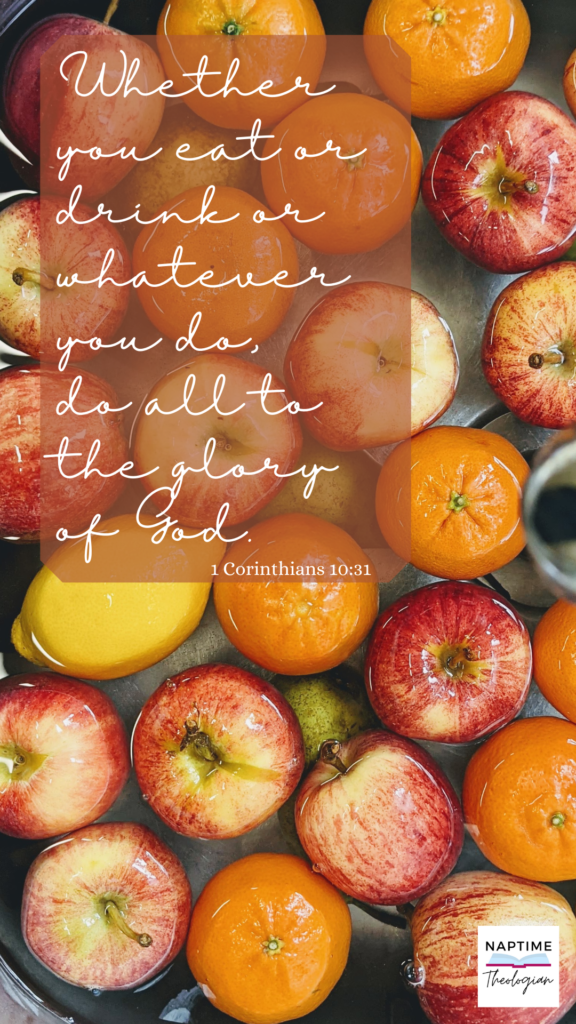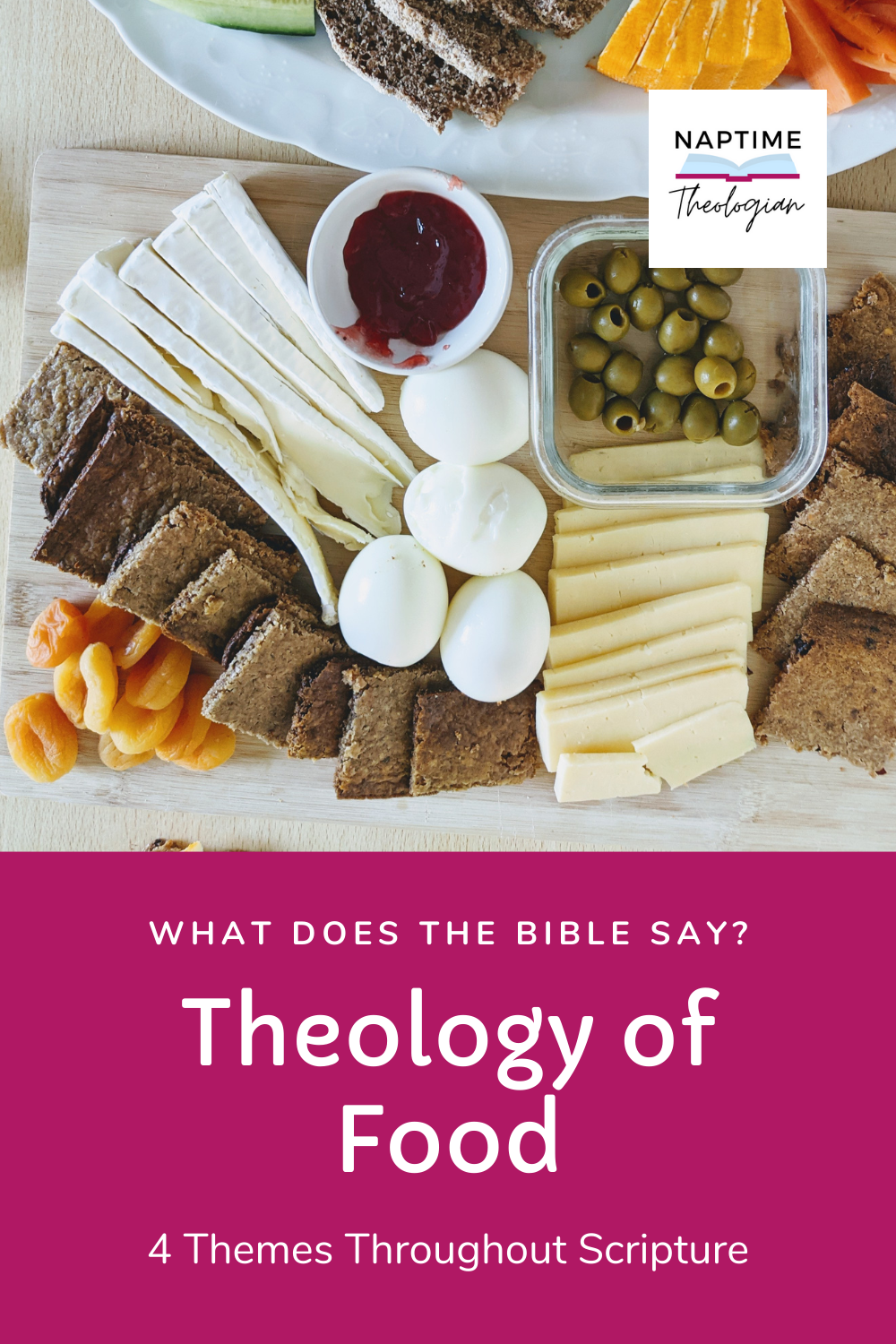We need food! The Bible doesn’t explicitly instruct us to eat food because it doesn’t have to. We know from living life that human beings need food. We can only go without eating for a couple of days (or a couple of hours if you’re like me). Children need food to grow and adults need food to function.
Food takes up a lot of our time as moms and homemakers. It also connects every human being because we all need it every single day in order to survive. But what does the Bible have to say about food? There are 4 main themes in the Bible that use food to demonstrate truths about us, our redemption, and God’s provision in all things. And while many books have been filled with the discussion of food and the Bible, it is these 4 themes that will be covered in this post: Food Shows Our Need for God, Food Demonstrates Redemption, Food is for Gospel Fellowship, and Food Points Us to Eternity.
Let’s jump in!

1. Food Shows Our Need for God
The first theme we see in the Bible is that food is not just food for believers today.
Now, I don’t mean that food has some magical power. But for Christians, everything in life is important to God. So while we need to eat food every day in order to survive, we are not just eating food. In his chapter regarding Gluttony in the book Killjoys, Johnathon Bowers says that “Food was never meant to be an end in itself. It is a means of receiving needed nourishment and a sign pointing us to our need for God. The rhythm of hunger and satisfaction we experience in our stomach is a dramatization of the relationship between God and our very existence. This is the point of God’s word to Israel in Deuteronomy 8:3: ‘[M]an does not live by bread alone, but man lives by every word that comes from the mouth of the Lord.’”
Our need for food points to our need for God. We see this truth played out in the account of the Fall (Genesis 3). Adam and Eve are given perfect, abundant food in the garden of Eden. They can eat to their fill of whatever they please. But it wasn’t just the abundant fruit in the garden that Adam and Eve needed, it was the word that God gave them to follow that brought them life. They couldn’t live by bread alone.
As we know, they did not adhere to that word from the Lord and disobeyed bringing huge changes to the world and even to their diets. Part of the curse is that it was not easy to grow food (Genesis 3:18-19). There are now vines, weeds, and thistles that make growing consumable plants difficult. Adam had to work hard to produce food from the ground, what a change from the Edenic garden filled with low-hanging fruit.
So eating food, is not just eating food. For the believer, it signifies our deeper need for God and His Word.
2. Food Demonstrates Redemption
The second theme of food in the Bible is that eating meat demonstrates redemption.
Before the Fall, Adam and Eve did not eat meat in the garden because there was no death in the garden. Immediately following the Fall, God kills an animal to provide coverings for Adam and Eve. Death provided a way for Adam and Eve to commune with God.
Then in Genesis 9, God declares all living creatures edible. Fellowship with God is restored via animal sacrifice. My husband wrote his MDiv thesis on feasting in the Bible and I like his comment on meat eating after the Fall: “A living being had to lose its life in order for man to have fellowship with God again. That is the indelible mark that the Fall left on divine-human relationship and food plays a key role in demonstrating that reality.”
Eating meat post-fall is a continual reminder of sin because something had to die. But it is also a continual reminder of redemption because that death brings you physical life, sustenance for your body.
This is exactly why Jesus refers to himself as the “bread of life” (John 6:35). Sinful human beings must have perfect, living flesh die in our place sacrificially in order to have communion with God again, to no longer be separated from Him. That’s exactly what Jesus did for us on the cross. His death brings you spiritual life, sustenance for your soul.
That is why we commemorate Jesus’ death through communion, the eating of bread of wine (er, juice).
Jesus restored table fellowship between man and God by sacrificing His own flesh and blood on the tree. He tells us to drink His blood and eat His flesh (John 6:54) by believing in Him as Savior.
The restoration of fellowship between man and God was restored by Jesus on the cross, but He also lived in light of that coming reality during His life on earth pre-crucifixion by fellowshipping with others around the table.
3. Food is for Gospel Fellowship
That brings us to the third theme of food in the Bible: Food is for gospel Fellowship.
Because Jesus has taken our place on the cross, we can have fellowship with God. Jesus demonstrated this fellowship by fellowshipping with people on earth before He died for them.
One of the main accusations that the Pharisees had against Jesus was that He ate with sinners, outcasts, and rebels (Mark 2:13-17). But when Jesus eats with these people, the outcasts of society, they are eternally changed (e.g. Zacchaeus in Luke 19:1-10). The food that they ate together provided an opportunity for the gospel to go forth and change people’s lives.
Jesus’ example of fellowshipping together around food was followed in the early church (Acts 2:42) and the disciples’ further ministry following Jesus’ ascension. Peter’s conversion to include Gentiles in the church comes through a dream regarding food (Acts 10). Because all the food is declared clean, Gentiles and Jews could eat together, unifying the church as one in Christ. Later in Acts 16:34, the Philippians jailer eats with Paul and Silas and his whole family is converted and baptized–talk about gospel fellowship!
When we eat together with fellow believers, we are celebrating the unity we have in Christ through the salvation He has provided. Christians eating together is truly a taste of heaven on earth. But just a taste.
4. Food Points Us to Eternity
Only a taste because the true meal, the meal of all meals, the eternal meal that will satisfy and will be with God, is yet to come. The fourth theme of food in the Bible is that Food Points Us to Eternity.
The opening words of the Bible, “In the beginning…” already tell us that there is an end. And that end will be better than the beginning, perfect. Adam and Eve had the ultimate feast before them in the garden. All they could eat, anytime anywhere. That will also be true for us in eternity at the marriage supper of the Lamb (Revelation 19:7-9) which is described by the prophet Isaiah in chapter 25. It is an elaborate, rich, and immense meal which will celebrate the restoration God has brought to His people.
We see a glimpse of this sumptuous feast in Solomon’s kingdom here on earth. First Kings 4:22-28 detail all the food that Solomon had available for each day in his kingdom. And while Solomon was not perfect, he was a picture of a Messiah-like king who ruled over Jerusalem. His feast in 1 Kings is a picture of the true Messiah’s feast we will enjoy at the end of time.
All Christians from everywhere in the world, every walk of life, every nation, will be eating together at this feast in eternity. That is why we get a taste of it when we fellowship over food with other Christians here on earth. This truth pushed Paul to rebuke Peter in Galatians 2:4-5. Peter was not eating with Gentiles, he was not enjoying that taste of heaven on earth that the Gospel so sweetly provides to Christians. And that was hypocritical, for the same gospel he preached to the Gentiles gave both him and them the ability to eat together in unity as all believers will in eternity. Peter was refusing to live in light of the gospel by refusing to eat in unity with Gentiles.
So our eating together as believers demonstrates the reality that we will one day eat together with ALL believers at the marriage supper of the Lamb. We can eat together to nourish our physical bodies, but at the same time, look forward to when we will eat together with Jesus.
Glorious Food
These 4 four themes in the Bible shows that eating food is for God’s glory. He has taken one of the most mundane things of earth, eating, and made it glorious. God has elevated food from mere fuel for every day and given it eternal meaning. (Which He does for all aspects of life as believers.)
First Corinthians 10:31 says, “Whether you eat or drink or whatever you do, do all to the glory of God.” I pray that these themes I’ve highlighted will help you do that today and every day at your table.

Related Posts:
Theology of Clothing
Why Study Theology?
Theology of the Trinity




5 Comments
Excellent
Thank you so much for reading!